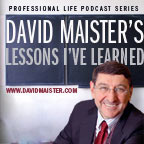
Leading global consultant, business author, A-list blogger and podcaster David Maister presents a podcast of highlights from his speaking engagements covering his four main topic areas: Strategy, Management, Client Relations, and Careers.
Managing Professionals: Attitudes, Skills and Behaviors
This series of podcasts entitled 'Managing Professionals: Attitudes, Skills and Behaviors' explores how to better build your business through marketing, client services, client relations, and selling. New episodes will be added on a weekly basis.
As a new feature to my podcast, I will be including a link to the executive summary of each chapter of my book as a pdf. I encourage you to forward these to friends and colleagues who may be interested in the materials covered in this series.

TITLE | TIME |
15. Why Bother? Summary and Review | (11:25) |
Reviewing the podcast series, the final episode examines the reasons someone would want to perform the managerial role, and provides guidance to further reading on the subject.
TITLE | TIME |
14. You Cannot Manage Through Pay Schemes | (21:30) |
This episode debunks the commonly-held myth that formal performance evaluation systems and compensation schemes are the keys to managing professionals. It shows why pay schemes can, and usually do, backfire.
TITLE | TIME |
13. Develop Your Group’s Rules of Membership | (27:32) |
Groups function best when the group itself defines the rights and obligations that group members have to each other. This episode explains precisely how to accomplish that goal.
TITLE | TIME |
12. Clarify Group Goals | (13:12) |
This episode moves beyond the topic of managing individuals and examines the challenge of managing groups of professionals. It stresses that the goals and purpose of the group must be explicitly identified before you can do any other kind of managing.
TITLE | TIME |
11. Tackle Your Prima Donnas | (18:01) |
In every professional environment there are people whose individual contribution is high, but who disrupt the performance of the team. This episode explores ways of minimizing the disruption and co-opting these people to the larger team goal.
TITLE | TIME |
10. Help Underperformers | (16:12) |
This episode stresses the key role of managers in helping to raise performance, not just monitor it. It examines the wide variety of reasons that lead individuals to underperform, and suggests practical ways to respond.
TITLE | TIME |
9. Deal Differently With Different People | (20:56) |
Using a model commonly applied in business discussions, this episode explains how you can get a head start in trying to understand how different people must be managed, and how to recognize the type of individual you are dealing with.
TITLE | TIME |
8. Motivating Professionals | (22:21) |
Inviting listeners to reflect on what motivates them, this episode explores the factors that cause professionals in all walks of life to move from competence and compliance to excitement, enthusiasm and dedication.
TITLE | TIME |
7. What A Manager Must Be, Believe and Do | (16:43) |
Based on statistical research in 13 countries, as well as in-depth case studies, David reports on the precise characteristics of managers who have created high-achievement teams.
TITLE | TIME |
6. The Management Strain | (24:32) |
We continue examining the special attitudes and skills of a manager by looking at what makes the manager role different from being a top practitioner. As the title of the episode indicates, the role contains demands that do not appeal to everyone.
TITLE | TIME |
5. Why Should I Follow You? | (17:37) |
This episode is the first in a sequence that examines the essential characteristics of an effective manager. Here we explore the importance of integrity, values, style and competence.
TITLE | TIME |
4. A Natural Manager | (19:26) |
The opening episode in this series describes how a 20-something manager of a personal training gym in Boston has discovered, and applies intuitively, many of the key principles in effectively managing professionals of all kinds.
TITLE | TIME |
3. How Managers Add Value | (18:31) |
What is the best way to think about the role of a manager in leading a group of professionals? How does a manager really make a difference to the performance of individual professionals and to the team?
TITLE | TIME |
2. A Great Coach in Action | (25:59) |
Using his own experience as a young faculty member at the Harvard Business School, David describes in precise detail (and with precise language) how he was coached. The general lessons are then extracted from the story.
TITLE | TIME |
1. How Managers Should Spend Their Time | (19:59) |
This episode examines the most effective use of a manager’s time, exploring the competing claims of financial administration, personal client work, business development, client relations and time with group members, formal and informal.

















